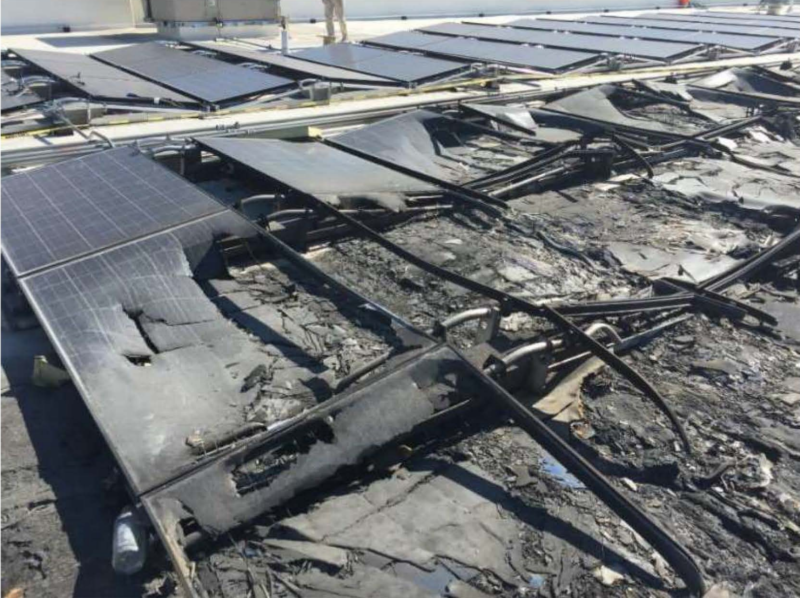
Walmart filed a multi-million dollar lawsuit against Tesla on Tuesday. The retail giant says Tesla's "negligent installation and maintenance" of solar panels caused fires on the roofs of as many as seven Walmart stores since 2012.
Most people think of Tesla as an electric car manufacturer, but Tesla also sells other products related to renewable energy. Since the 2016 acquisition of SolarCity, Tesla has had a substantial solar panel business. Walmart hired SolarCity to install and manage solar panels on the roofs of more than 240 Walmart stores. Unfortunately, Walmart says, these solar installations had a habit of catching fire.
One fire broke out in March 2018 on the roof of a Walmart in Beavercreek, Ohio.
"Local news photographs and videos of the store showed a tremendous plume of black smoke emerging from flames as firefighters arrived at the scene," Walmart says in its lawsuit. Customers and staff were evacuated safely, but the fire did extensive damage to the store and destroyed hundreds of thousands of dollars in merchandise.
In May 2018, Walmart suffered two blazes just eight days apart—one in Denton, Maryland and the other in Indio, California. The Indio fire alone did millions of dollars of damage, Walmart claims.
Walmart had previously suffered fires at stores with SolarCity installations in 2012, 2016, and 2017, but the company had written these off as isolated accidents. But a string of three fires in as many months was hard to ignore. So Walmart asked Tesla to deactivate all of its Walmart solar panels pending an investigation. Even after this was done, Walmart suffered another fire at a store with Tesla solar panels—this one at a Yuba City, California store in November 2018.
“Widespread, systemic negligence”
Walmart says that Tesla's own inspections revealed "a total of 157 action items requiring repairs or replacement of system components, 48 of which Tesla itself characterized as reflecting conditions that rendered the sites unsafe or potentially unsafe." Walmart's own follow-up inspections turned up even more problems, the retailer charges.
Walmart's investigation "revealed that Tesla had engaged in widespread, systemic negligence and had failed to abide by prudent industry practices in installing, operating, and maintaining its solar systems," Walmart claims.
Walmart further says Tesla has been stiffing it on the costs of dealing with the defective solar panels.
"Despite months of back-and-forth with Walmart, Tesla has yet to pay one cent of the out-of-pocket damages and consulting/inspection fees that Walmart incurred as a result of the fires at Denton, Indio, and Yuba City, as well as consultant and attorneys' fees related to the Beavercreek fire," Walmart writes in its Tuesday complaint.
Tesla has not yet responded to a Tuesday afternoon email seeking comment.
Walmart's lawsuit is more than 100 pages long, with pages of detailed explanations of Tesla's alleged installation problems. Under its contract with Walmart, Tesla is supposed to do regular maintenance on the solar panels. But Walmart says Tesla failed to properly hire, train, and supervise the contractors doing installation and maintenance work for Tesla.
Among the problems Walmart claims to have identified:
- "Many of the Tesla solar panels inspected by Walmart were suffering from hotspots, resulting in cracking of the back sheets on solar modules and compromising electrical insulation."
- "Making matters worse, Tesla had flagged or identified hotspots by placing pieces of tape over the affected areas. Because this tape prevented sunlight from reaching the solar panel, it exacerbated the problem by further concentrating heat."
- "Tesla teams consistently failed to torque (or tighten) field-made connectors." "The lack of torqueing [sic] leads to moisture and water intrusion."
- "Sharp points—from, among other items, rough concrete or metal edges—were cutting into or abrading wires. In other cases, temperature changes resulted in the expansion and contraction of wires over time, moving the wires and resulting in their abrasion or exposure.
- Multiple sites had improper grounding.
Walmart says it spent months trying to work with Tesla to fix the problems but found Tesla's responses unsatisfactory. So it's now suing Tesla—seeking not only damages but also approval to remove Tesla's solar panels from its stores.
Tesla's 2016 proposal to acquire SolarCity was controversial from the outset. SolarCity was founded by cousins of Elon Musk, and Musk was an early investor and chairman of the board. Critics charged that Tesla's acquisition of the debt-laden company amounted to a bailout of its shareholders—including Musk himself.
The acquisition does not seem to have turned around SolarCity's fortunes. Tesla's solar panel division has struggled with production problems and declining market share. Many of the workers Tesla laid off earlier this year were in the solar panel division, and Tesla plans to end a partnership with Home Depot at the end of the year.
Update (Friday, August 23): Tesla now says that it's working with Walmart to resolve the dispute.
reader comments
227